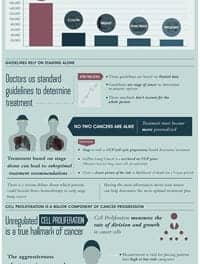Clarient Inc, a premier technology and services resource for pathologists, oncologists and the pharmaceutical industry, has announced the commercial launch of a new lung cancer test, Clarient Insight® Dx Pulmotype® test, that helps physicians classify specific types of lung cancer to identify which therapies may be most effective.
The new test has been clinically validated to use in the sub-classification of patients with non-small cell lung cancer (NSCLC), which accounts for approximately 85 percent of the more than 200,000 lung cancer cases diagnosed each year.
"Pulmotype provides pathologists with a valuable new tool to help their oncologist clients understand which patients are eligible for a number of new therapies now available for the treatment of NSCLC," said Chief Executive Officer Ron Andrews. "Its ability to accurately sub-classify lung cancer will enable physicians to make much more informed and effective therapy decisions. We have built a very strong breast cancer franchise and established Clarient as the ‘go-to’ laboratory for complex breast cancer testing. Pulmotype allows us to offer a similar compelling reason for pathologists and oncologists faced with critical decisions in lung cancer to send the primary tumor samples to Clarient. Having the lung cancer sample in our hands at the beginning of the diagnostic process allows us to assist the pathologist and the oncologist throughout the patient care process by delivering information on additional molecular markers, such as EGFR mutation and KRAS."
The Pulmotype test consists of a panel of biomarkers that allows physicians to classify NSCLC into adenocarcinoma or squamous cell carcinoma subtypes, which are key distinctions in choosing the most effective therapy. Newly developed targeted therapies can be very effective but can also be very toxic depending on the patient and his or her disease characteristics.
"Given the types of therapies on the market today, the kind of information generated from a panel like Pulmotype can make a big difference in how a patient is treated," said Ken Bloom, MD, Chief Medical Officer for Clarient. "The correct pathology assessment is essential for therapeutic decision making, given the powerful new drugs currently on the market to treat lung cancer, such as Avastin® and Alimta®.
"The use of these therapies is predicated on the histologic differentiation of the cancer into categories such as non-squamous NSCLC cancer or squamous NSCLC, which are classifications that Pulmotype can help provide. Furthermore, the power to identify patients with adenocarcinomas in non-small cell lung cancers also promotes finding patients that also harbor EGFR mutations, which have been shown to predict response to a number of tyrosine kinase inhibitors. We believe this test will quickly demonstrate its value as a critically important tool in the assessment of lung cancer."
Clarient Insight Dx Pulmotype is the first commercial test launched following the Company’s recent acquisition of Applied Genomics Inc. (AGI). AGI developed Pulmotype and recently validated the test with a clinical study cohort of more than 1,000 patients. The peer-reviewed results were published in the August 2009 edition of Modern Pathology. A link to that study can be accessed online.
Ron Andrews continued, "The combination of Pulmotype and EGFR should differentiate Clarient from its competitors and could become a key driver of revenue growth. Our goal is to be the first place a pathologist goes after diagnosing NSCLC. Having a primary diagnostic test like Pulmotype on our menu should help us capture a growing number of lung cancer tumor specimens for initial testing. In addition, Pulmotype can identify the cancers that will benefit from knowing the EGFR mutation status, which should strengthen our ability to gain a greater share of the fast-growing EGFR mutation test market. The validation and launch of Pulmotype within eight weeks of closing the AGI acquisition is a testimony to Clarient’s ability to rapidly integrate technology into its lab operation and commercialize a new complex cancer diagnostic."
Source: Clarient



